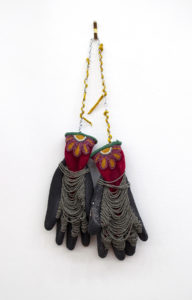National Indigenous Peoples Day
June 21: Celebrating the diverse heritage and cultures of First Nations, Inuit, and Métis peoples
National Indigenous Peoples Day
June 21: Celebrating the diverse heritage and cultures of First Nations, Inuit, and Métis peoples
Through our EleV initiative, we are deepening our work alongside Indigenous youth and communities. As part of this, we look to uplift and amplify the voices of Indigenous youth as change agents in their communities and for Canada as a whole.
Statement from Reeta Roy, President and CEO
Culture, Connection, and Resurgence
We invited young Indigenous artists from across Canada to respond to a question: “What does Mino Bimaadiziwin (living a good life) mean to you?” We will be compiling a collection of their responses in a book: Culture, Connection, and Resurgence. To mark National Indigenous Peoples Day, we are featuring a number of these artists here.
Art is a powerful medium that can convey much more than words alone. Culture, Connection, and Resurgence celebrates the aspirations, talent, and vision of young Indigenous artists. Together, the art and statements shared with us are a call to action and urge us to recognize the importance of reclaiming Indigenous wisdom and, along with Indigenous youth themselves, let that wisdom guide a new era of transformation.
Monique Aura Bedard, Onyota’a:ka (Oneida) & French Canadian
“To me, living in a good way is about living life from the heart and with a good mind. I believe that walking on the land with love and respect alongside all Nations and all relations is at the core of living in a good way. My art is my voice, my truth, and an extension of who I am. I hope my art reaches others in a way that inspires thoughts and feelings igniting curiosity, reflection, and self-love.”
To follow Monique:
- On Instagram @monique.aura
Mitch Case, Métis
“Flowers, berries, leaves, and stems, they shine, they shimmer – twist and turn. They reflect who we were, who we are, who we are forever becoming. As we bead, we tell stories: beautiful stories, painful stories, sacred stories, and yes, some tall tales. We talk about the news and our latest Netflix favourites – because in spite of it all, we are still here, still beading, still telling our stories. The good life is when we gather enough stories to put ourselves back together again, so we can be whole enough to create new stories to pass on.”
Follow Mitch:
- On Instagram @Mitch.Case
- On Twitter @MitchCaseSSM
Dayle Kubluitok, Inuit
“When I was younger, I remember my grandma, great–uncles, and great-aunts telling me Inuit legends and myths, and they always sounded like ghost stories. Living a good life to me means learning more about my culture and passing on our traditions to my family.”
Follow Dayle:
Animikiik’otcii Maakaai, Anishinaabe
“Mino Bimaadiziwin means having hopes and dreams that inspire you to live every day in a way that brings you closer to those things that make you feel whole. Dancing shawl is something I have long aspired to do, and I remind myself of that every day; it inspires me to make the choices that will get me to where I want to be. Living in a good way also means gradually shedding the layers of colonialism to remember who I am, where I come from, and who I came from.”
Follow Animikiik’otcii:
- On Instagram @dancingbizhiki
Kaya Joan, Afro–Caribbean (Jamaican/ Vincentian) & Indigenous (Kanien’kehá:ka/ Garifuna)
“I practice living in a good way by offering thanks and acknowledging the spirit and energy of all that surrounds me. This is a method of healing, which I express in this piece through colour and form, as well as overlaying the medicines, cedar, sage, and tobacco. This layering and scanning process speaks to the interdimensionality of healing, and how it is not a linear process. To live in a good way, I must be well and in a process of healing, so I can show up for my family and community.”
Follow Kaya:
- On Twitter: @itskayajoan
- On Instagram: @kayajoan
Audie Murray, Métis
“To live in a good way is to listen to your heart and honour yourself. To live in a good way is to tell the stories that need to be told, when it is right to tell them.”
Follow Audie:
- On Instagram @ audie.m_
Jordan Stranger, Oji-Cree
“What Mino Bimaadiziwin means to me is to live out the Seven Sacred Teachings as best as you can. To be mindful of everyone and everything around you. To carry yourself with kindness and empathy for all living things. To honour your ancestry through cultural practice and to help others with it. Our people have endured and persevered through many hardships. Seize the opportunity we have today and take back what those sought to take from you: who you are.”
Follow Jordan:
- On Instagram @totemdoodem









